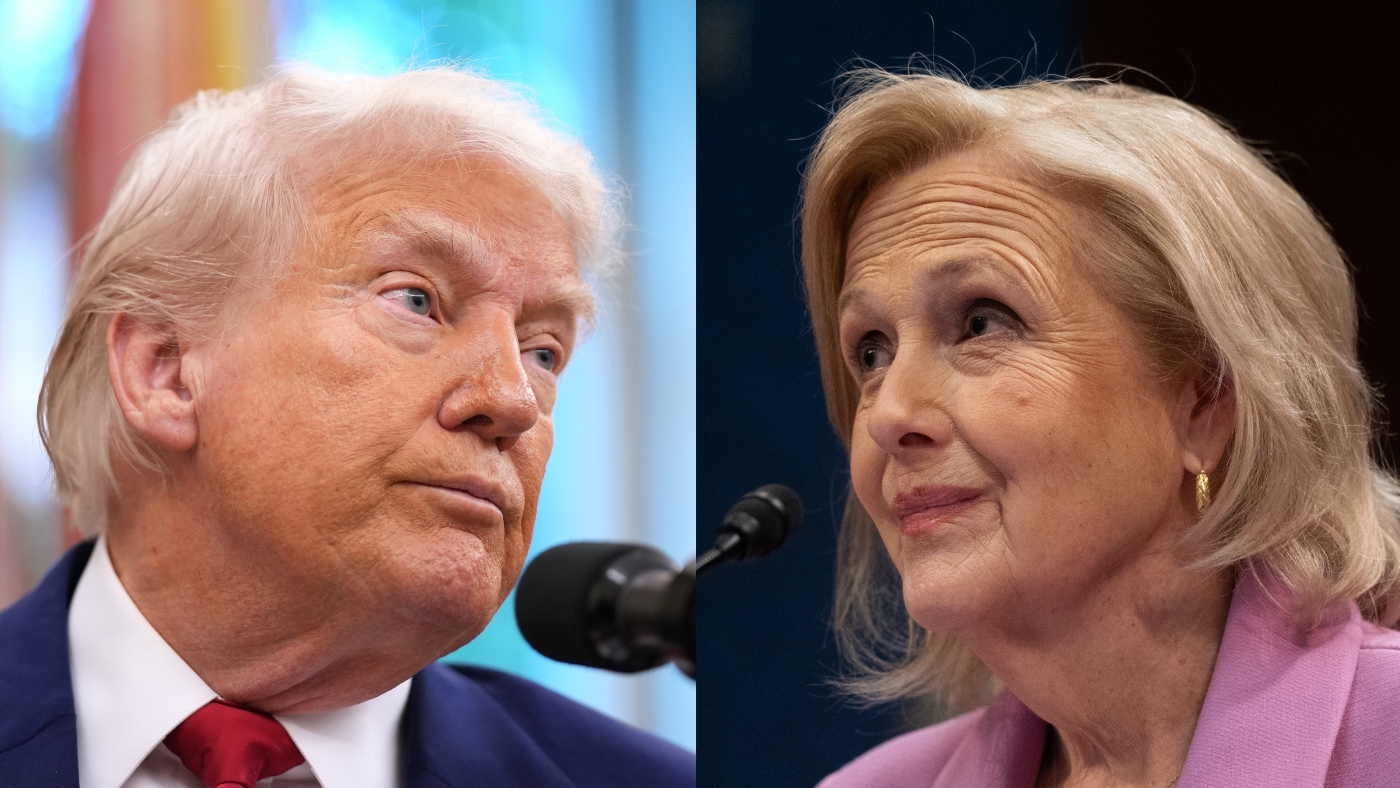PBS and Minnesota public TV station sue Trump White House – NPR
Source: NPR
President Trump issued an executive order directing the Corporation for Public Broadcasting and public television stations to withhold funds from PBS. On Friday, PBS — led by Paula Kerger (right) — and Lakeland PBS of Minnesota sued.
Andrew Harnik/Getty Images, Nathan Posner/Anadolu via Getty Images
hide caption
PBS and a public television station in rural Minnesota filed suit on Friday against President Trump over his executive order demanding that the Corporation for Public Broadcasting kill all funding for the network.
The suit alleges Trump’s order is unlawful, exceeding his authority as president and violating Constitutional protections of free speech because he has made clear he doesn’t like PBS’s news coverage and programming.
“This action challenges an unprecedented presidential directive attacking PBS and its member stations… in a manner that will upend public television,” the lawsuit states.
It continues: “The EO makes no attempt to hide the fact that it is cutting off the flow of funds to PBS because of the content of PBS programming and out of a desire to alter the content of speech. That is blatant viewpoint discrimination and an infringement of PBS and PBS Member Stations’ private editorial discretion.”
PBS President and CEO Paula Kerger declined comment Friday.
In a statement, the network said, “After careful deliberation, PBS reached the conclusion that it was necessary to take legal action to safeguard public television’s editorial independence, and to protect the autonomy of PBS member stations.”
The Minnesota station echoed PBS’ logic, saying it joined the lawsuit “to underscore the dire consequences on local member stations and our programming.”
In response, the White House said CPB is “creating media to support a particular political party on the taxpayers’ dime.”
“Therefore, the President is exercising his lawful authority to limit funding to NPR and PBS,” White House spokesperson Harrison Fields said in a statement. “The President was elected with a mandate to ensure efficient use of taxpayer dollars, and he will continue to use his lawful authority to achieve that objective.”
Trump’s executive order accuses NPR and PBS of failing to provide “fair, accurate, unbiased and nonpartisan news.” He asserts that there are plenty of media options for people to choose from nowadays.
“Government funding of news media in this environment is not only outdated and unnecessary but corrosive to the appearance of journalistic independence,” the order states. It bans CPB from sending any money to PBS and NPR, and bars local stations from sending the networks any federal money.
On social media platforms, Trump has blasted the networks in capital letters: “REPUBLICANS MUST DEFUND AND TOTALLY DISASSOCIATE THEMSELVES FROM NPR & PBS, THE RADICAL LEFT ‘MONSTERS’ THAT SO BADLY HURT OUR COUNTRY!”
Beyond that, the lawsuit filed by PBS and Minnesota affiliate Lakeland PBS argues, “regardless of any policy disagreements over the role of public television, our Constitution and laws forbid the President from serving as the arbiter of the content of PBS’s programming, including by attempting to defund PBS.”
PBS’ legal action follows parallel litigation filed on Tuesday by NPR and three Colorado public radio stations against the Trump administration on the same grounds.
The public television court filings say PBS would lose $81 million per year in federal grants and “a substantial portion” of the $227 million that public TV stations pay it in order to run programs that range from children’s shows to Ken Burns documentaries. A day after Trump issued his order, the U.S. Education Department cancelled a grant to CPB and PBS that paid for a major educational initiative – about $31 million annually.
Lakeland PBS, serves a region in Northern and central Minnesota that includes some of the state’s poorest counties and several tribal reservations. The station offers the only nightly television news program covering the region and offers curricular videos, lesson plans and other resources for local educators, according to the lawsuit.
While PBS member stations receive, on average, about 15% of funding directly from CPB, Lakeland PBS relies on federal grants from CPB for 37% of its annual revenues. It says that all of the money it pays PBS for programming and other services comes from those federal funds.
PBS shows make up more than half of Lakeland PBS’s lineup.
The lawsuit contends that Lakeland PBS does not have enough unrestricted funds simply to shift other money over to pay for the cost of PBS programs. And it says that financial support from local companies is declining, not increasing. Locally based philanthropic money has been hard to come by.
“Lakeland PBS cannot readily or affordably replace such content and services,” the lawsuit states. “The EO’s indirect funding bar thus poses an existential threat
Read more: Click here
